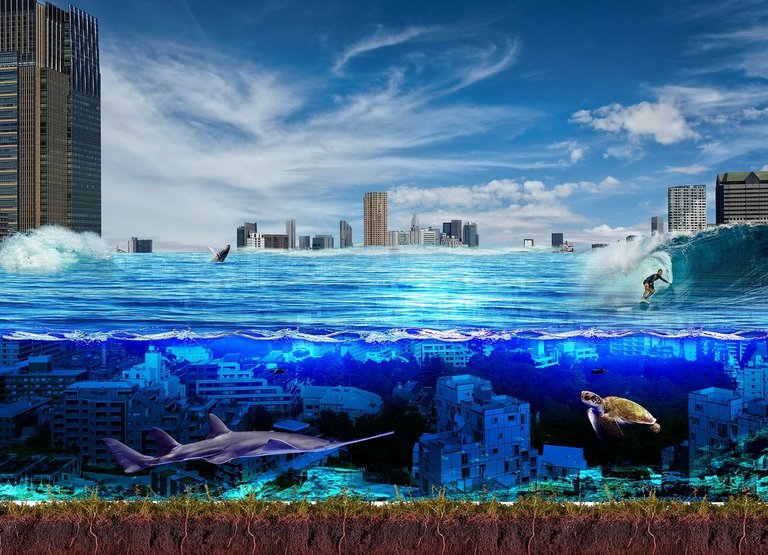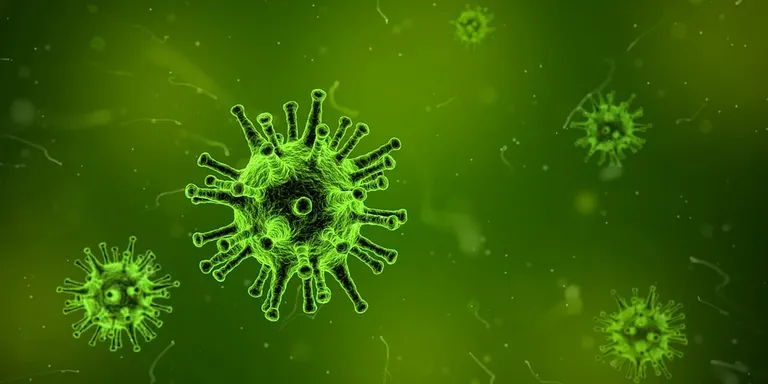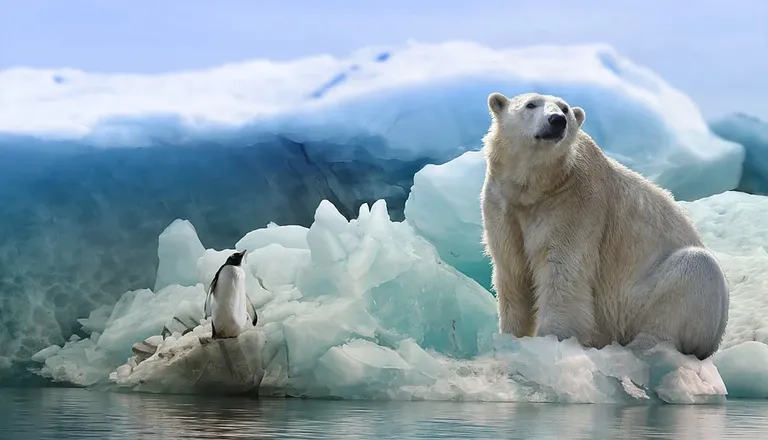a few days ago I had the opportunity to watch the news from CNN Indonesia regarding a research expedition to one of the highest mountains in eastern Indonesia. Mount Jaya Wijaya. one of their main goals is to research and monitor the glaciers that cover the peak of Mount Jaya Wijaya.
video source : CNN Indonesia
and in the news, it's said that the researchers revealed that the glaciers that cover the peak of Mount Jaya Wijaya continue to melt from time to time due to global warming and are predicted to run out in 2025.
this news is both sad and worrying at the same time. it's sad cause the one and only glacier in my country will disappear soon. and it's worrying that global warming is real and will have an impact on human life in the future.
this melting glacier on Mount Jaya Wijaya in Indonesia is only a small part of the full story. as a whole, the glaciers in the world are indeed in melting conditions. Antarctica, which is one of the regions on earth that has the most ice reserves, is currently melting.
Potsdam Institute for Climate Impact Research (PIK) in Germany, last year released their research report on ice conditions in Antarctica. and by using computer simulations to model how Antarctica will look thousands of years from now. The researchers believe that a few degrees of temperature increase over a continuous period of time will make Antarctica lose its ice in the future.
as a measure, if average temperatures rise 4 ° C above pre-industrial levels for a sustained period of time, much of the ice in West Antarctica will collapse, and seawater will rise to 6.5 meters in the next millennia. an even worse scenario predicts that if the temperature increases to 10 ° C in a sustained period then the Antarctic continent will lose its ice completely and the sea level will rise to 58 meters in the future..
Although this report is only a prediction, what we need to know is that until today global warming continues and shows no signs of stopping.
So what would happen if all the glaciers melted?
Underwater City

Underwater City may sound like a figurative word, though it can also have real meaning. that there will be lots of areas on this earth that sink when all the glaciers melt.
in an article written by Henrik Selin, Assistant Professor of International Relations, Boston University. published on the Britannica news site. informs that by 2100 it's estimated that global sea level will increase to 0.45-0.82 meters under the RCP 8.5 emission scenario. however, according to the report, sea-level rise could be higher due to continued high warming in places such as Greenland, which is causing the glacier to melt at an accelerating rate.
It was further stated that based on paleoclimatic evidence shows that an additional 2 ° C warming could cause the destruction of the Greenland Ice. so it will lead to an increase in sea-level of 5-6 meters.
based on the report, This situation will submerge large numbers of islands and low-lying areas. The coastal lowlands that are vulnerable to sea-level rise include important parts of the US Gulf Coast and the East Coast, the Netherlands and Belgium (two European Low Countries), other big cities like Tokyo, Shanghai are also affected.
at the time, Jakarta as the capital city of Indonesia will not have a chance. it will be the first city under the sea.
The ancient viruses and bacteria would spread

as we know that, currently the world is in a difficult time due to the covid-19 virus pandemic. This virus has resulted in many infections as well as casualties. and the world is still not recovering from this pandemic.
The existence of this covid-19 pandemic has certainly illustrated to us how dangerous a malignant virus is spreading. and it seems that in the future we have to be more careful with viruses because the researchers found a fact that there are bacteria and viruses that are inactive for a long time, trapped in glaciers for centuries and they will come back to life when the earth's climate warms up.
I think It's common knowledge that viruses or bacteria that have been trapped in the ice sheet for thousands or even millions of years will back on when the ice sheet melts.
for example in 2005, a group of NASA scientists succeeded in reviving a bacterium called Carnobacterium pleistocenium that had been encased in frozen ponds in Alaska for 32,000 years.
even a few years ago a joint study by Chinese and US scientists managed to detect 28 viruses in the Tibet plains glaciers that trapped for 15,000 years. we know that humans have existed side-by-side with bacteria and viruses. From the bubonic plague to smallpox, we've evolved to resist them, and in response, they've developed new ways of infecting us. and we may be familiar with them, but how to deal with the dangerous virus originated thousands or millions of years ago?
Arctic Animal Extinction

We all know that when the Glacier on this earth melts, especially in places where many native species live such as polar bears, penguins, walruses and etc. these animals will be severely affected. even worse, it will make them extinct.
Polar bears are even predicted to be polar animals that might become extinct earlier when the glacier as their habitat melts. As the main predator in their habitat, polar bears will find it difficult to adapt to their hunting because of melting glaciers
Recent research conducted by the US Geological Survey and UC Santa Cruz found that the polar bears are currently facing a hard battle to find enough food to survive for global warming that continues to change their environment. The researchers also discovered that polar bears actually have an average metabolism of 50% higher than previously thought. it will certainly make it even more difficult for polar bears. The need for food is big but the space for hunting is reduced.
Conclusion
The melting of the earth's ice sheets or glaciers as a result of global warming is a real thing. the effects could be felt by humans today. in fact, there are still many bad effects caused by global warming, melting glaciers may be only a small part. but it will have a big impact on earth enough. it's not only humans who will suffer losses but all living things as well.


References
- https://en.wikipedia.org/wiki/Glacier
- https://www.pnas.org/content/116/52/26382
- http://www.bbc.com/earth/story/20170504-there-are-diseases-hidden-in-ice-and-they-are-waking-up
- https://www.britannica.com/science/global-warming/Ice-melt-and-sea-level-rise
- https://www.nationalgeographic.com/science/article/polar-bears-starve-melting-sea-ice-global-warming-study-beaufort-sea-environment
- https://www.businessinsider.com/what-if-all-ice-earth-melted-overnight-2019-10?r=US&IR=T#:~:text=As%20we%20slept%2C%20sea%20levels,population%20out%20of%20their%20homes.
- https://www.idntimes.com/science/discovery/izza-namira-1/yang-akan-terjadi-saat-es-kutub-mencair/7
- https://www.bbc.com/indonesia/majalah-53481958
- https://www.livescience.com/antarctica-ice-free-climate-change.html
Congratulations @arnol99! You have completed the following achievement on the Hive blockchain and have been rewarded with new badge(s) :
Your next target is to reach 500 upvotes.
Your next target is to reach 3750 upvotes.
You can view your badges on your board and compare yourself to others in the Ranking
If you no longer want to receive notifications, reply to this comment with the word
STOPCheck out the last post from @hivebuzz:
Yay! 🤗
Your post has been boosted with Ecency Points.
Continue earning Points just by using https://ecency.com, every action is rewarded (being online, posting, commenting, reblog, vote and more).
Support Ecency, check our proposal:
Ecency: https://ecency.com/proposals/141
Hivesigner: Vote for Proposal
Thanks for your contribution to the STEMsocial community. Feel free to join us on discord to get to know the rest of us!
Please consider supporting our funding proposal, approving our witness (@stem.witness) or delegating to the @stemsocial account (for some ROI).
Thanks for including @stemsocial as a beneficiary, which gives you stronger support. Using the STEMsocial app could yield even more supporti next time.